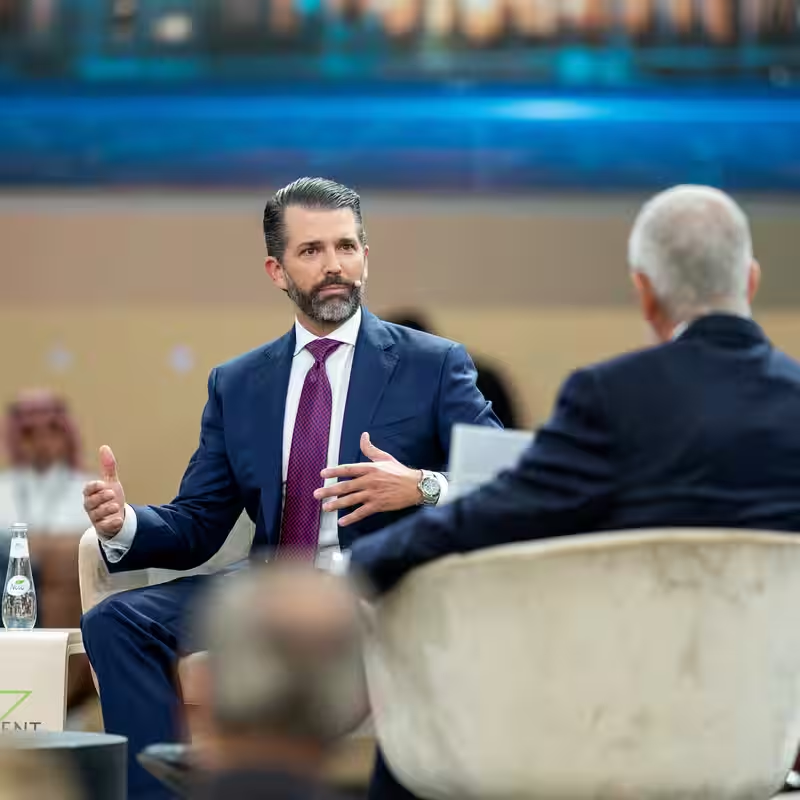In a striking blend of geopolitics and venture capital, Donald Trump Jr. took center stage at a high-profile business forum in Riyadh this week to promote his investment firm, 1789 Capital, and its vision of “patriotic capitalism”—a strategy that ties U.S. tech investment directly to national security and Trump-era policy goals.
What Is ‘Patriotic Capitalism’?
Speaking at the Saudi summit on October 29, 2025, Trump Jr. described 1789 Capital’s mission as rebuilding American industrial strength through strategic investments in artificial intelligence (AI), defense technology, and domestic supply chains.
“We understand what the administration wants to do, because we helped craft some of that messaging,” Trump Jr. said, referring to his father, former President Donald J. Trump, who is widely expected to run again in 2028. “So we can be on the outside but still have that understanding of what they plan to do.”
The phrase “patriotic capitalism” has gained traction among conservative investors who view private capital as a tool to advance national interests—particularly in competition with China.
Why Saudi Arabia?
The choice of venue raised eyebrows. Saudi Arabia, long criticized for its human rights record, has become a magnet for Western financiers seeking capital amid global economic uncertainty. The kingdom’s Public Investment Fund (PIF) has poured billions into U.S. tech and entertainment ventures in recent years.
While Trump Jr. emphasized that 1789 Capital invests exclusively in U.S.-based private companies, his presence at a Saudi-hosted event underscores the complex web of global capital flows—even among firms preaching economic nationalism.
AI and Defense: The Core of 1789 Capital
Founded in 2023, 1789 Capital has quietly built a portfolio focused on dual-use technologies—tools that serve both commercial and military purposes. These include AI-driven logistics platforms, secure communications software, and next-gen drone systems.
“We’re not just chasing returns,” Trump Jr. told attendees. “We’re building the infrastructure America needs to win the 21st century.”
Political Implications
Critics argue that blending family branding with policy influence blurs ethical lines. By claiming insider knowledge of a potential future administration’s agenda, Trump Jr. positions his firm as uniquely positioned to anticipate regulatory and defense spending shifts.
Supporters counter that this alignment reflects a coherent strategy—one that leverages political insight to de-risk investments in volatile sectors like defense and AI.
Market Context: Rise of Ideological Investing
| Firm | Investment Focus | Political Alignment |
|---|---|---|
| 1789 Capital | AI, defense, U.S. manufacturing | Conservative / Trump-aligned |
| SoftBank Vision Fund | Global tech, AI, robotics | Neutral / Saudi-backed |
| Andreessen Horowitz | Web3, biotech, AI | Libertarian-leaning |
| BlackRock Impact Fund | Climate tech, ESG | Progressive |
Public Reaction and Scrutiny
Trump Jr.’s remarks have reignited debate over the ethics of political dynasties monetizing policy influence. Transparency advocates note that while 1789 Capital discloses its portfolio companies, it does not reveal its limited partners—raising questions about who ultimately benefits.
Still, the firm has attracted attention from defense contractors and Silicon Valley engineers alike, many of whom see value in a fund that champions American sovereignty in an era of global tech rivalry.
What’s Next for 1789 Capital?
With the 2026 midterms and potential 2028 presidential run looming, 1789 Capital appears poised to expand. Industry insiders report the firm is raising a second fund, with a target of $500 million—double its initial capital.
Whether “patriotic capitalism” becomes a lasting investment philosophy or a campaign-era branding exercise remains to be seen. But one thing is clear: in today’s fractured financial landscape, ideology is increasingly part of the pitch.
Sources
The New York Times: Donald Trump Jr. Pitches ‘Patriotic Capitalism’ at Saudi Summit




